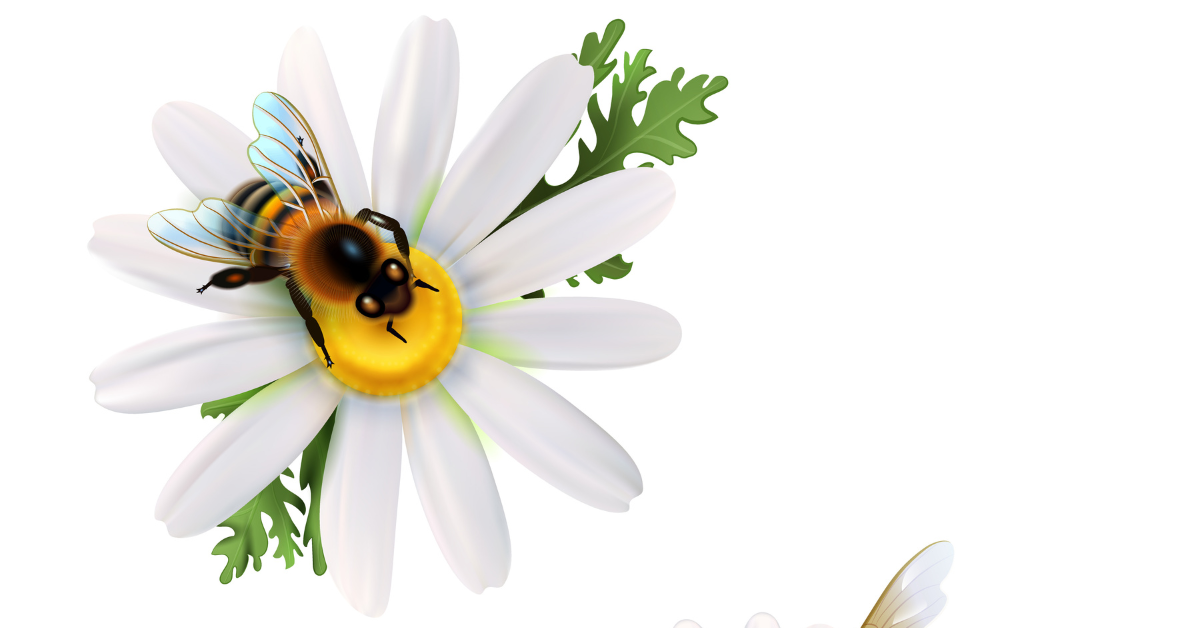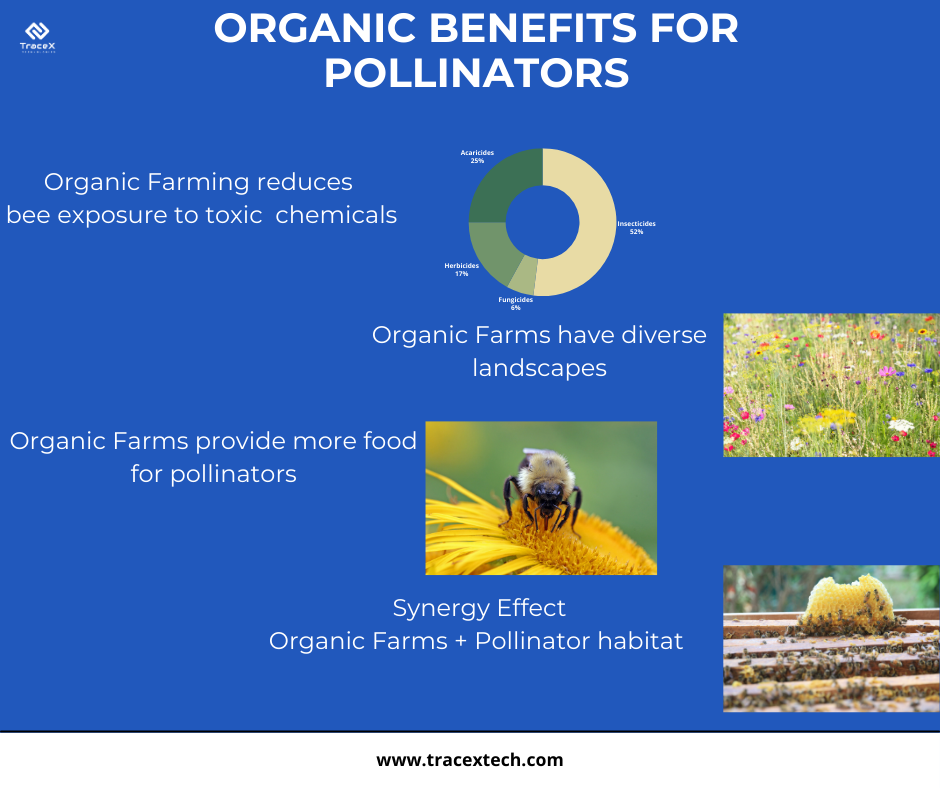Contact: +91 99725 24322 |
Menu
Menu
Quick summary: Uncover the crucial link between organic farming and pollinator health. Dive into our blog to explore how organic practices safeguard pollinators, ensuring a thriving ecosystem and global food security. Discover the pivotal role organic agriculture plays in supporting biodiversity.

Pollinators and organic agriculture form a crucial symbiotic relationship, where the health of one profoundly influences the vitality of the other. Organic farming, with its commitment to eschew synthetic chemicals and embrace natural processes, emerges as a key player in nurturing and safeguarding pollinators – the unsung heroes vital for the reproduction of numerous plant species, including those integral to our food systems.
In the last decade beekeepers have lost over a third of their bee hives, leaving many farmers worried about their ability to meet demands for bee-pollinated crops. Honeybees are responsible for about $12.4 billion worth of crops per year.
In this exploration of the role of organic practices in pollinator health, we delve into the harmonious coexistence that unfolds when farming methods prioritize ecological balance and sustainability. Join us on this journey as we unravel the interconnected tapestry of organic practices and pollinator well-being, understanding how conscientious agricultural choices contribute to a flourishing ecosystem.
Organic farming is an agricultural approach that avoids synthetic pesticides, fertilizers, and genetically modified organisms. Instead, it relies on natural methods like crop rotation and composting to maintain soil fertility and control pests.
Pollinators play a crucial role in agriculture by facilitating the reproduction of flowering plants. Bees, butterflies, and other pollinators transfer pollen between flowers, enabling the production of fruits and seeds. This process enhances crop yield and biodiversity.
The link between organic farming practices and pollinator health is substantial. Organic farms, with their avoidance of synthetic chemicals, provide a safer environment for pollinators. The absence of harmful pesticides promotes healthier bee populations, benefiting both ecosystems and crop pollination. Additionally, organic farms often incorporate diverse plantings, creating habitats that support a variety of pollinator species. This synergy highlights the positive impact organic agriculture can have on pollinator populations and overall ecological balance.

The success of pollination is crucial for the majority of plants to yield seeds and fruit. In agriculture, this vital process not only contributes to the formation of the edible parts of many essential crops but also plays a key role in securing seeds for the subsequent year’s planting. Pollination services are crucial for crop production, playing a significant role in ensuring global food security and nutrition.
According to Ecological economics, Pollination services are valued at $190 billion worldwide,1 meaning that without pollinators, the global agricultural community would lose $190 billion through decreased food quality and crop yields.
Pollinators play a vital role in ecosystems by facilitating plant reproduction. Their activity ensures the production of fruits, seeds, and new plants, contributing to biodiversity and ecosystem stability. Beyond agriculture, pollinators are integral to the survival of countless plant species, forming intricate ecological relationships.
In agriculture, pollinators significantly impact biodiversity. Their role extends beyond crop pollination to the support of wild plant species, fostering a rich and varied environment. The interdependence between pollinators and diverse crops enhances the resilience of agricultural ecosystems, making them less susceptible to pests and diseases.
The economic implications for agriculture are substantial. Pollinators contribute to crop yields, directly influencing the profitability of farming. The decline of pollinator populations can result in reduced harvests and increased production costs as farmers may need to resort to artificial pollination methods. Protecting pollinators is not only an ecological concern but also essential for sustaining global food production and the economic viability of agriculture.
A staggering 75% of crops essential for human consumption depend on pollinators, primarily bees, for successful cultivation.
Disturbingly, native and honeybee populations have experienced alarming declines in the past decade, posing a significant threat to global food security. Adding complexity to this predicament, several factors contributing to bee population declines are directly associated with commonly employed agricultural practices.
Growing scientific evidence underscores the detrimental impact of toxic synthetic pesticides, native habitat destruction, and reduced availability of nutritious forage resulting from extensive mono-cropping on pollinators.
Addressing these interconnected challenges—pesticide use, habitat loss, and climate change—is crucial for safeguarding pollinator populations and maintaining the delicate balance of ecosystems.
The absence of synthetic pesticides is a fundamental aspect of organic farming. Instead of relying on chemical solutions, organic farmers employ natural alternatives like companion planting, crop rotation, and biological pest control. This approach minimizes environmental pollution, protects beneficial insects, and ensures a healthier ecosystem.
Organic farming actively promotes biodiversity. By avoiding synthetic pesticides and cultivating diverse crops, organic farms create habitats that support a variety of plant and animal species. This biodiversity not only enhances the resilience of the farm ecosystem but also contributes to overall environmental health, fostering a more sustainable and balanced agricultural landscape.
Soil management techniques in organic farming prioritize the health of the soil. Practices such as composting, cover cropping, and reduced tillage enhance soil structure, water retention, and nutrient content. This results in improved soil fertility over time, reducing the need for synthetic fertilizers. Healthy soil is vital for plant growth, and these organic techniques contribute to sustainable and resilient agricultural systems.
Discover the 7 Best Practices for Sustainable Farming and how they shape the way we grow food.
Learn more
Organic farming standards not only prohibit the use of harmful synthetic pesticides, known for their toxicity to bees and persistence in the environment, but also mandate organic producers to adopt practices that enhance biodiversity and preserve natural resources. Among these practices, a common approach employed by organic farmers is the cultivation of insectaries, providing habitats and year-round food sources for pollinators. Integrative pest management techniques are also widely used, creating environments conducive to beneficial insects like pollinators by offering suitable habitats and nutritious floral resources. Numerous studies have affirmed that organic farming practices mitigate threats to honeybees, with organic farms supporting a significantly higher population of pollinators compared to conventional farms. Given the profound impact of pollinator health on food security, both producers and consumers play pivotal roles in fostering sustainable organic farming practices, thereby ensuring a resilient and thriving agricultural ecosystem for the future.
Technology solutions like TraceX serve as powerful tools for promoting and advocating organic farming practices by establishing trust, ensuring compliance, and fostering a more transparent and sustainable agricultural ecosystem. TraceX offers traceability solutions that allow consumers and stakeholders to trace the journey of agricultural products from farm to table. This transparency helps in showcasing the organic practices followed at each stage of production, instilling confidence in consumers about the authenticity of organic claims. By documenting and verifying each step of the production process, it becomes easier for farmers to comply with organic certification requirements. Organic farming often involves multiple stakeholders in the supply chain. TraceX provides visibility into the entire supply chain, enabling farmers, processors, and retailers to collaborate seamlessly.
In conclusion, organic farming emerges as a sustainable and environmentally conscious approach to agriculture. By emphasizing reduced exposure to harmful chemicals, the preservation of natural habitats, and the enhancement of biodiversity, organic practices not only contribute to healthier ecosystems but also address pressing concerns about the impact of conventional farming on the environment and human health. The absence of synthetic pesticides and fertilizers minimizes chemical residues in food, aligning with the growing demand for cleaner and more sustainable agricultural practices.
Furthermore, organic farming’s commitment to preserving natural habitats and promoting biodiversity reflects a holistic understanding of the interconnectedness of ecosystems. This approach not only benefits farmers by reducing dependence on external inputs but also fosters resilient and balanced environments that can adapt to changing conditions. As the world faces challenges like climate change and declining pollinator populations, embracing organic farming principles becomes increasingly vital for building a more sustainable and resilient agricultural future.
